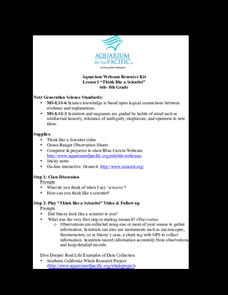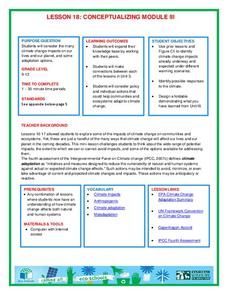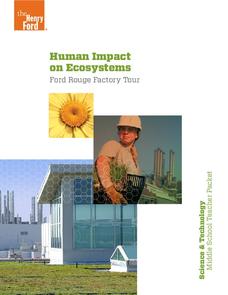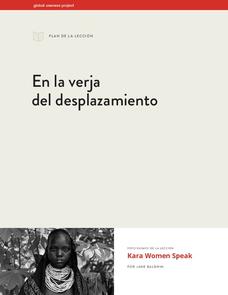Polar Trec
Do Microorganisms Live in Antarctica?
Can microorganisms live in the dry, cold climate of Antarctica? Young scientists view a research project measuring microorganisms in the Taylor Glacier. They record the findings from dirty ice, clean ice, boots, sediment, and more. Then...
Curated OER
Fracking: Positive or Negative Impact?
Your teenagers may have heard of fracking, but do they really know what it is? And could they debate the benefits and risks? Educate your environmental science class with a lesson about hydraulic fracturing, non-renewable energy sources,...
Aquarium of the Pacific
Think Like a Scientist
Scholars watch a video and meet a scientist who is studying sharks as she explains her observations about the sharks and provides her hypothesis to explain their behavior. Learners then act like a scientist as they watch an aquarium...
Crafty Classroom
Guided Scientific Method
Guide learners through an experiment with a set of worksheets on the scientific method. Six steps prompt your class to ask questions, conduct research, form a hypothesis, test theories, analyze data, and report results.
National Wildlife Federation
Conceptualizing Module III
Many researchers focus on one impact of climate change in isolation, but researchers gain a global perspective when they come together. A timely lesson teaches scholars about the projected impacts of global temperature increases. Then...
Henry Ford Museum
Human Impact on Ecosystems
An environmenta science unit includes three lessons plus a cumulative project covering the ecosystem. Scholars follow the history of the Ford Rouge Factory from its construction on wetlands and how it destroyed the environment to its...
Columbus City Schools
Get Your Organisms Organized
From large to small, show your class how to organize them all! Included within the guide is everything you need to take their knowledge of classification from the cellular to the species level. The worksheets focus on building vocabulary...
NOAA
Watch the Screen!
Can a sponge cure cancer? Life science pupils visit the drugstore under the sea in the fifth lesson of six. Working groups research the topic then get hands-on experience by testing the inhibiting effects of several plant extracts on E....
Howard Hughes Medical Institute
Gorongosa: Making Observations Activity
Do you have young scientists wanting to make new discoveries rather than just completing the same experiments? Young scientists use their observational skills to identify animals and patterns in animal behavior. Through tracking...
North Carolina State University
Exploring Genetics Across the Middle School Science and Math Curricula
Where is a geneticist's favorite place to swim? A gene pool. Young geneticists complete hands-on activities, experiments, and real-world problem solving throughout the unit. With extra focus on dominant and recessive genes, Punnett...
Radford University
Kite Project
Let the class' knowledge of geometry soar like the kites they create. After researching the history and science of kites, learners draw up a blueprint for their own kites. They then calculate the areas and perimeters based on the scale...
Global Oneness Project
On the Verge of Displacement
By having scholars tackle this interdisciplinary lesson, they'll see how social studies and environmental science are related as they explore the impact that the construction of a dam will have on the population and ecosystem of the Omo...
Kenan Fellows
Sustainability: Learning for a Lifetime – Soil
Do great gardeners really have green thumbs—or just really great soil? Environmental scholars discover what makes Earth's soil and soil quality so important through research and experimentation. Learners also develop an understanding of...
Curated OER
Artificial Selection
The second lesson in the series begins with a starter activity discussing wild versus domesticated animals. Then, scholars play a card game, with optional variations, to emphasize artificial selection. Next, they attend a field trip to a...
Curated OER
Acceleration Science
In collaborative groups, physics learners design and create a web portfolio of internet resoucres explaining poitive and negative acceleration, zero acceleration, and positive and negative velocity. This is a terrific assignment for...
Curated OER
That's Predictable - Stream Side Science
Research the impact that changes in biotic or abiotic factors might have on an ecosystem. Debate for or against the changes and take action in the community. This resource ideally follows stream studies that young ecologists may have...
Bonneville
Researching Chemicals and Materials for Solar Cell Construction
Revolutionize the solar cell industry with a new design. The 10th of 14 lessons in the Cost Effective Solar Cells unit has pupils start a project in which they design a unique solar cell. They receive an introduction to the project,...
Consortium for Ocean Science Exploration and Engagement (COSEE)
Carbon Dioxide & Krill: Impacts
What effects do temperature and carbon dioxide levels have on the zooplankton of Antarctica? This concluding lesson plan in a short unit on climate change and the ocean helps environmental scientists answer these questions. After...
Curated OER
Sustainability and Extinction
Galapagos Penguins are the only penguins on earth that live north of the equator (in the wild). In this last lesson plan a discussion on how the Galapagos islands developed their populations and diversity sparks the introduction. Two...
Big Learning
The Antarctica Project: A Middle School Mathematics Unit
Antarctica is a big place, large enough to provide ample opportunities to learn about math. A two-week unit teaches middle school mathematics concepts using project-based learning. The resource covers functions, geometry (area,...
Polar Trec
Touring the Poles
Would you want to vacation in the Arctic or Antarctic regions? Scholars research both regions and produce a travel brochure trying to convince tourists to visit. The project focuses on the geography, climate, flora, fauna, and indigenous...
Teach Engineering
Design Step 2: Research the Problem
How do you get started designing a product to meet your engineering design goals? Here, learners gain understanding of an important aspect of the engineering design process: background research. Through brainstorming and worksheets,...
Howard Hughes Medical Institute
Human Impacts on Biodiversity
Have you always wanted to take your science class on an amazing field trip they will never forget? Now you can! Observe the wildlife in an African savanna through trail cameras with a five-part data analysis activity. Learners analyze...
Star Wars in the Classroom
Star Wars Geography Unit
What kind of animals live on an ice planet like Hoth? How would the habitat on Tatooine allow different organisms to thrive? Connect social studies, science, and Star Wars in one engaging activity that focuses on the ecosystems of the...

























